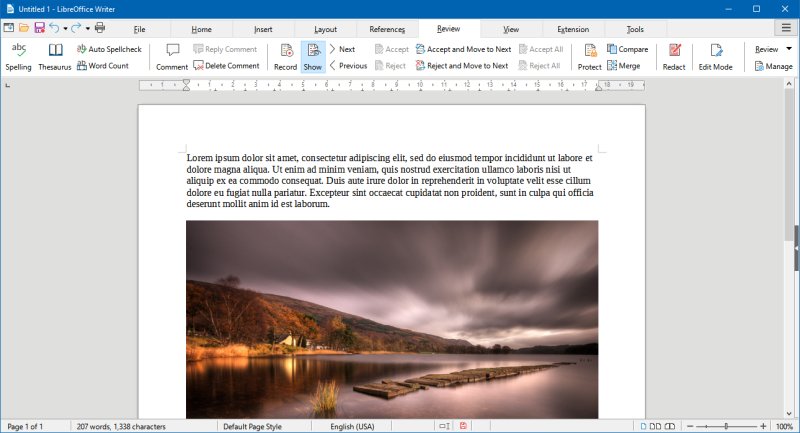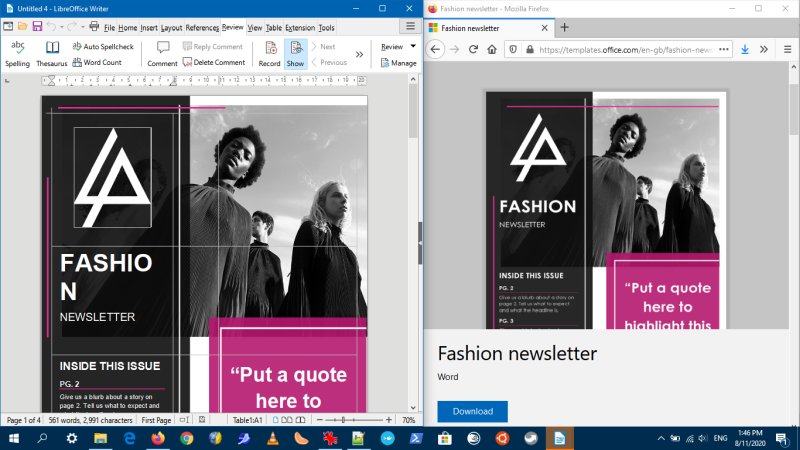Updated: August 19, 2020
Over the last few years, I've done a fair share of Libreoffice reviews, focusing on different usability angles. First, there's the program itself and what it does, then whether it's suitable for everyday office use in the Office-heavy reality, and largely because of the previous point, the million-dollar question of when and if and how LibreOffice could actually become a viable, realistic substitute for (Microsoft) Office. My findings from the past dozen summers say no.
I feel there's been a steady slowdown in open-source enthusiasm in general - this of course affects LibreOffice, too. Across this entire space, we haven't made any significant progress since 2014-ish or so. But every time a new version of LibreOffice comes out, I rush to test it, to see if this is going to be THE version that weans me off Office. I think I represent the bulk of Windows users, who are dependent on the platform for office and gaming, all other considerations notwithstanding. With LibreOffice 7.0 out, we need to see what gives.
Setup
My usual testing covered both Windows and Linux. On the former, the installation worked fine, but it took forever. About 10-15 minutes to finish. No idea why. But after that, LibreOffice 7 was available, and it pointed to all my documents and whatnot, without any problems.


All is quiet on the Western front
In general, LibreOffice retains a solid degree of consistency with previous versions. You have the hybrid classic UI plus the half dozen layouts, including full-sized and compact contextual, grouped, tabbed and whatnot. This is a nod toward the Ribbon interface, and then some, allowing you to experiment with different view modes, and thus, productivity. LibreOffice 7 brings in some polish and tweak - quite nice. But the problems aren't in the basic functionality - never have been really.


I did find both Impress and Calc slightly more refined than in the past - non-Writer programs often get neglected. Calc is starting to look reasonably presentable, with cleaner, brighter default colors, although speed is still somewhat meh. Impress comes with some nifty tools, but most of them fall into the "rookie mistakes" bucket, for those who think animation and slide transitions are useful. You can probably notch a reasonably productive pack in Impress.


Styles
No news here - and that is I'm afraid bad news. The styles management in LibreOffice isn't as good as it is in Microsoft Office. First, you don't have a list of recently used styles you can one-click apply. Secondly, if you use the sidebar, you need to double-click. Thirdly, the styles list jumps to current style for the selected area rather than stays put, leading to an annoying and unproductive usage model. Say you want to apply STYLE4 to a paragraph (which currently has default settings). You move the keyboard cursor onto the new paragraph, and boom, the styles list jumps to the very beginning. You are forced to scroll back to STYLE4, and then use a double-click to apply it. We're talking 3-5 more mouse clicks per action than Microsoft Office.

Microsoft Office compatibility
Another big one. It's not about good and evil, not about right or wrong, not about ideology, morality, anything of that sort. Pure and simple pragmatism. Your non-techie colleague or boss or client sends you a file they created in Microsoft Office. You need to send them data back. Can you afford mistakes?
As always, I grabbed a bunch of DOTX, DOCX templates from Microsoft and opened them in LibreOffice. Just like in version 6.3, there were problems. Most documents rendered badly - text overflow, positioning, etc. One of the files wouldn't open - it threw an error, and if you ignore the error and go forward, you get a useless conversion. Utterly wrong.

Notice the word FASHION. Notice the image border (missing).

The image is badly stretched.

Notice the table top picture borders and how they show in LibreOffice. Notice the three stars above the word Restaurant. Notice the aspect ratio of the chef. Notice the way the year number (2018) touches the gray frame.
And sadly, realistically, this is what it should look like:


The message speaks for itself.
And the thing is, this is the very thing that blocks LibreOffice from gaining wider adoption. We can wait for the world to turn around and change their ideology and acknowledge the moral supremacy of open-source and whatnot, or we can try to give people high-fidelity tools that can replace their Microsoft Office. Because today, LibreOffice cannot. There's little or no hope without this.
Other stuff
Performance slash responsiveness wasn't stellar. I've noticed a certain degradation in how snappy the LibreOffice programs have been over the years. The biggest change occurred round 6.X, and it still persists, regardless of the underlying platform. Not sure why.
I also tried using the media player (inside Impress), and it couldn't correctly play a random media file. I had audio, but no video - the actual video feed did show up for maybe 100 ms somewhere in the middle of the clip, but that was all. Hardly encouraging.

Community ...
Not strictly related to the software, but recently, there's been furor over TDF trying to find new revenue streams, with a proposed idea of Personal/Enterprise Editions of LibreOffice. Along those lines. And can you guess what the response from the community was? Disdain and anger. Because not only are we expected to get products for free, other people should also work for free for us, right? That simply doesn't work.
I would gladly pay for LibreOffice, but then, it also has to have a justifiable level of professional usability, which allows me to use the product out there freely, without any fear that my books, resume or other vital information will get lost or malformed in some format conversion.
Conclusion
Linux, Firefox, LibreOffice. I see the same pattern really. It's becoming harder and harder for open-source projects to flourish in the shark-eat-shark market that the modern Internet has become. Goodwill carries only that far, but then tenacity and stubbornness founded in ideology don't help either. With LibreOffice, it could have been a simple optional toggle to choose between native and Office Open XML formats, and that way, open an entire world of possibilities. But when pretty much any semi-complex file created in Office looks wrong when loaded in LibreOffice, I simply cannot make it into my daily driver.
On top of that, LibreOffice feels stagnant. No, user interfaces need not change every Monday to look modern or some nonsense like that. But there's no reason to stick with a 2003 interface - with all its inefficiencies mind - just because the competition does the opposite. And then, when LibreOffice does acknowledge there is a third way, then you get way too many options - five or six UI layouts too many really. Finally, LibreOffice simply isn't as productive as it could be. I'm saying this as someone with 1,000,000+ words written every year, a good deal of them in Writer. It can be more streamlined, more elegant. Like it or not, you usually need fewer actions in Microsoft Office to achieve an (equivalent) result.
If you look at LibreOffice in isolation, version 7.0 is really nice. Better than before - except responsiveness - more refined, with a cleaner look. But we live in a mixed world, and there, it struggles with a handful of simple, pragmatic everyday tests. And the worst thing is, there seems to be no strategy out of this loop. Another version with tiny changes? That hasn't shifted the needle so far. I truly hope LibreOffice does kick off a commercial model. We need something fresh and fun - in a meaningful way. In its current guise, it's pretty much like biannual Linux distro releases, more of the same, with no real added value or growth. And it's not about the users actually - people will happily use free products and whatever. It's about the LibreOffice developers, who will eventually give up, when they realize there's no end in sight - the sad reality of the majority of unpaid open-source projects. Let's hope LibreOffice has a brighter, more vibrant future.
Cheers.